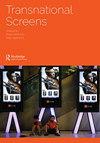The digital ethical space: towards a transnational documentary ethics, a filmmaker’s point of view
IF 0.4
0 FILM, RADIO, TELEVISION
引用次数: 0
Abstract
ABSTRACT Over the last decade the integration of web-based technologies into the film supply chain has accelerated a huge shift in the way documentary films are distributed and exhibited. This shift has seen a move away from the previous analogue systems- built on the exclusivity of time and space- into new convergent and transnational methods based on digital systems. This has (had) huge ramifications for all areas of documentary making, none more so than on the issue of documentary ethics. Above all other forms of film (and filmmaking), ethics is one of the key factors that define and distinguish the documentary film. However, much of the ethical frameworks and discourse currently used are from the previous analogue period of distribution and exhibition. Using the making of a feature documentary as a case study, this article explores how the changes in exhibition and distribution have affected the ethical frameworks that have traditionally informed the making of a documentary. The study concludes by demonstrating how current ethical frameworks and safeguarding procedures, undertaken by both documentary makers but also regulatory bodies, need to be rethought in order to respond to the challenges inherent in this transnational landscape.数字伦理空间:走向跨国纪录片伦理,一个电影人的视角
在过去的十年中,基于网络的技术与电影供应链的整合加速了纪录片发行和放映方式的巨大转变。这种转变已经从以前的模拟系统(建立在时间和空间的排他性上)转向基于数字系统的新的趋同和跨国方法。这对纪录片制作的各个领域都产生了巨大的影响,尤其是在纪录片伦理问题上。在所有其他形式的电影(和电影制作)中,伦理是定义和区分纪录片的关键因素之一。然而,目前使用的许多伦理框架和话语都来自以前的传播和展示的模拟时期。本文以一部专题纪录片的制作为例,探讨了展览和发行的变化如何影响了传统上为纪录片制作提供信息的道德框架。该研究的结论是,为了应对这一跨国格局中固有的挑战,纪录片制作人和监管机构需要重新思考当前的道德框架和保护程序。
本文章由计算机程序翻译,如有差异,请以英文原文为准。
求助全文
约1分钟内获得全文
求助全文
来源期刊

Transnational Screens
Arts and Humanities-Visual Arts and Performing Arts
CiteScore
0.60
自引率
0.00%
发文量
23
 求助内容:
求助内容: 应助结果提醒方式:
应助结果提醒方式:


